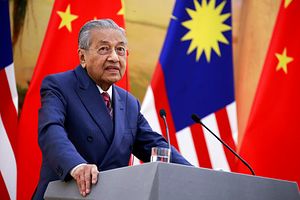A year after the shock victory of Malaysia’s opposition in elections on May 9 returned the country’s longest-serving premier Mahathir Mohamad to power, the general foreign policy approach of the new Pakatan Harapan (PH) government is gradually becoming clearer amid a mix of continuity and change. As we hear more about the PH government’s foreign policy, whether it be in terms of specific issues or focus areas or the articulation of what officials have been terming a new foreign policy framework, it will be important to evaluate it from the perspective of both the broader opportunities and challenges it poses as well as the context within which it is being unveiled now and into the future.
While there has been some continuity in Malaysia’s foreign policy over the past five decades with respect to the advancement of general priorities – including the fostering of closer bilateral ties with neighboring states, the expansion of the country’s role in regional and global fora, and an attempt to maintain equidistance between major powers, including the United States and China – there has also been some change amid that continuity. For instance, the PH government inherited a mixed foreign policy legacy left over from the Najib years, with some successes – from the relative warming of Malaysia-Singapore ties to leadership on issues such as terrorism – but also significant challenges including a meager defense budget, an underperforming economy, and a more divided country.
Though it is still early days, as we approach the year mark since the PH government came to power, we have seen a mix of continuity and change in how it has managed the country’s foreign relations, with an unsurprisingly greater media focus on the changes, be it in on specific issues such as tensions with Singapore, reviewing infrastructure projects with China in its Belt and Road Initiative (BRI) or broader priorities including enhancing Malaysia’s ratification of international rights agreements. And while the PH government has not released a standalone foreign policy document that details its approach, in recent months, officials including Foreign Minister Saifuddin Abdullah have been advancing the government’s general foreign policy orientation as well as an approach being advanced within the government known as the Foreign Policy Framework (FPF).
Those familiar with the FPF have suggested that the approach as it stands thus far is generally anchored around the theme of “change within continuity,” articulating long-held principles within Malaysian foreign policy – including an emphasis on solidarity with fellow Muslim and developing nations as well as the need to engage a diverse range of major powers – while also advancing areas of change, not only in terms of granular issues related to security, economics, and identity, but also wider structural matters, such as strengthening role of the foreign ministry in the formulation of foreign policy, the need for better interagency coordination, the better integration of civil society and the people.
While it is difficult to evaluate the FPF at this point given that it has yet to be fully unveiled, its framing offers promise and builds on some of the tendencies we have already seen with the PH government’s foreign policy. For instance, the focus on integrating a more diverse set of views into the foreign policy process is similar to the view that is being advanced with respect to the formulation of the country’s first-ever defense white paper, expected to be released later this year with implications for foreign policy as well. There is also a broad net cast in terms of areas such as on security priorities despite initial worries about a potential narrowing and inward-looking tendency, with references made to the management of the South China Sea disputes, elevating some of Malaysia’s efforts to date in terms of counterterrorism and cybersecurity, and also addressing broader issues including major power relations and the Indo-Pacific concept, which Southeast Asian states and ASEAN as a grouping have been trying to respond to.
Yet at the same time, these opportunities are also accompanied by challenges for the PH government’s foreign policy approach. Some of the issues that were evident at the end of Najib’s time in office, such as the difficulty of boosting defense spending to address gaps in Malaysia’s security, remain issues under the new government, as evidenced by the 10 percent cut in defense spending seen in the government’s first budget last year. The PH government’s win and the return of Mahathir at the helm has also brought about new domestic political issues that can get in the way of the advancement of foreign policy priorities, with a case in point being the government’s recent reversal on the Rome Statute issue earlier this year. And even as the government continues to unveil its foreign policy, will be broader questions surrounding the sustainability of the approach, from the impact of the leadership transition from Mahathir to Anwar Ibrahim to whether the PH government will get another term following Malaysia’s next general election.
To be sure, lest one gets too carried away thinking too much about Malaysia’s foreign policy prospects, it is important to keep in mind that we are just a year into a new government following an unprecedented change in government since the country’s independence, with much that remains in flux at home and abroad. But as we hear more about aspects of the PH government’s foreign policy approach in the coming months in what continues to be a contested political environment at home and a heightened level of international interest in Malaysia, it is important to keep in mind the broader perspective of what it inherited, what it faces today, and what it will have to contend with in the future to truly assess how this will fare in the years to come.
































